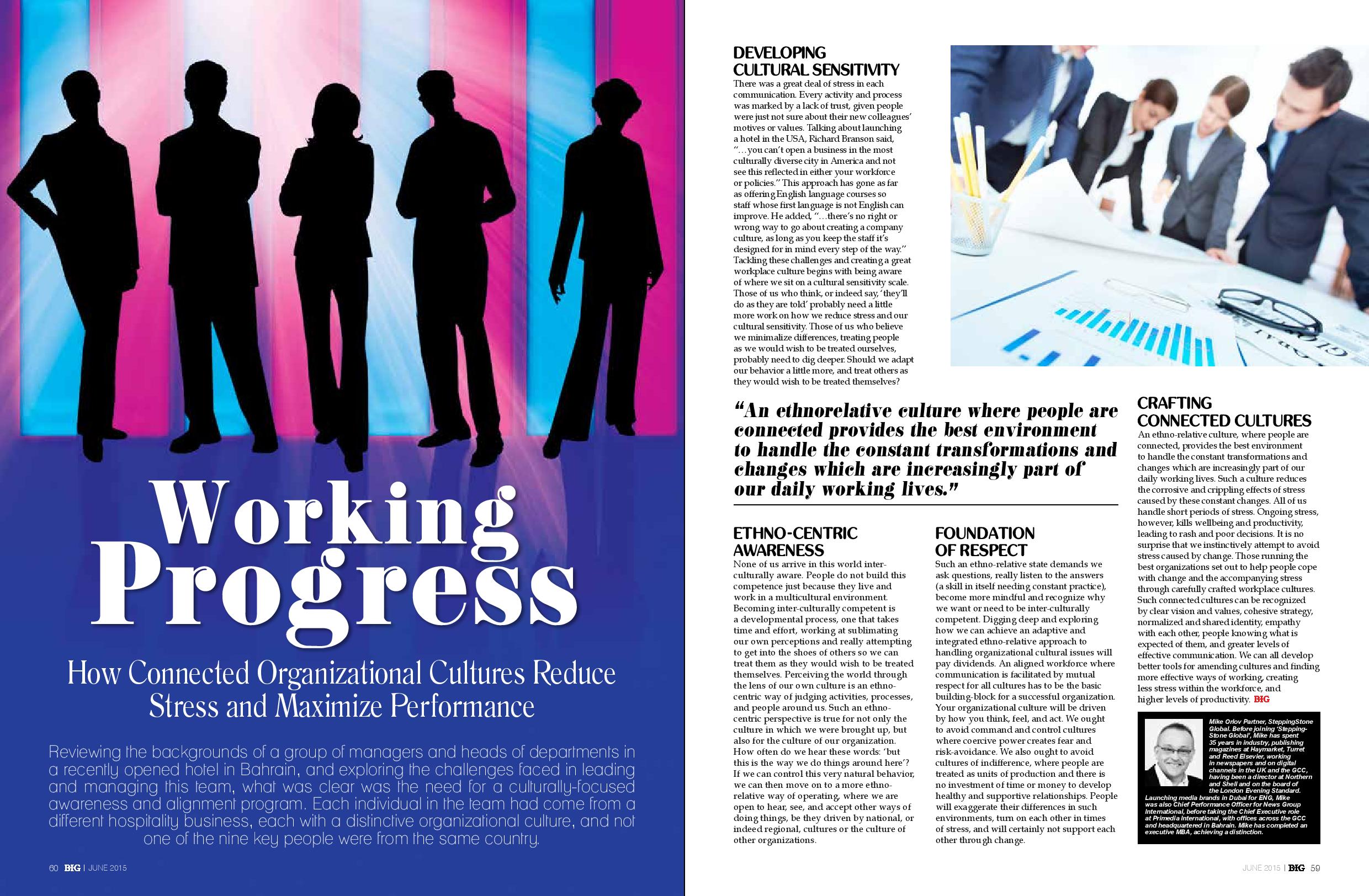 Working Progress
Working Progress
How Connected Organizational Cultures Reduce Stress and Maximize Performance
Reviewing the backgrounds of a group of managers and heads of departments in
a recently opened hotel in Bahrain, and exploring the challenges faced in leading
and managing this team, what was clear was the need for a culturally-focused
awareness and alignment program. Each individual in the team had come from a
different hospitality business, each with a distinctive organizational culture, and not
one of the nine key people were from the same country.
DEVELOPING CULTURAL SENSITIVITY
There was a great deal of stress in each communication. Every activity and process
was marked by a lack of trust, given people were just not sure about their new colleagues’
motives or values. Talking about launching a hotel in the USA, Richard Branson said,
“…you can’t open a business in the most culturally diverse city in America and not
see this reflected in either your workforce or policies.” This approach has gone as far
as offering English language courses so staff whose first language is not English can
improve. He added, “…there’s no right or wrong way to go about creating a company
culture, as long as you keep the staff it’s designed for in mind every step of the way.”
Tackling these challenges and creating a great workplace culture begins with being aware
of where we sit on a cultural sensitivity scale. Those of us who think, or indeed say, ‘they’ll
do as they are told’ probably need a little more work on how we reduce stress and our
cultural sensitivity. Those of us who believe we minimalize differences, treating people
as we would wish to be treated ourselves, probably need to dig deeper. Should we adapt
our behavior a little more, and treat others as they would wish to be treated themselves?
“An ethno-relative culture, where people are
connected, provides the best environment to handle the constant transformations and
changes which are increasingly part of our daily working lives.
ETHNO-CENTRICAWARENESS
None of us arrive in this world interculturally aware. People do not build this
competence just because they live and
work in a multicultural environment. Becoming inter-culturally competent is
a developmental process, one that takes time and effort, working at sublimating
our own perceptions and really attempting to get into the shoes of others so we can
treat them as they would wish to be treated themselves. Perceiving the world through
the lens of our own culture is an ethnocentric way of judging activities, processes,
and people around us. Such an ethnocentric perspective is true for not only the
culture in which we were brought up, but also for the culture of our organization.
How often do we hear these words: ‘but this is the way we do things around here’?
If we can control this very natural behavior, we can then move on to a more ethnorelative
way of operating, where we are open to hear, see, and accept other ways of
doing things, be they driven by national, or indeed regional, cultures or the culture of
other organizations.
FOUNDATION OF RESPECT
Such an ethno-relative state demands we ask questions, really listen to the answers
(a skill in itself needing constant practice), become more mindful and recognize why
we want or need to be inter-culturally competent. Digging deep and exploring
how we can achieve an adaptive and integrated ethno-relative approach to
handling organizational cultural issues will pay dividends. An aligned workforce where
communication is facilitated by mutual respect for all cultures has to be the basic
building-block for a successful organization. Your organizational culture will be driven
by how you think, feel, and act. We ought to avoid command and control cultures
where coercive power creates fear and risk-avoidance. We also ought to avoid
cultures of indifference, where people are treated as units of production and there is
no investment of time or money to develop healthy and supportive relationships. People
will exaggerate their differences in such environments, turn on each other in times
of stress, and will certainly not support each other through change.
CRAFTING CONNECTED CULTURES
An ethno-relative culture, where people are connected, provides the best environment
to handle the constant transformations and changes which are increasingly part of our
daily working lives. Such a culture reduces the corrosive and crippling effects of stress
caused by these constant changes. All of us handle short periods of stress. Ongoing stress,
however, kills wellbeing and productivity, leading to rash and poor decisions. It is no
surprise that we instinctively attempt to avoid stress caused by change. Those running the
best organizations set out to help people cope with change and the accompanying stress
through carefully crafted workplace cultures. Such connected cultures can be recognized
by clear vision and values, cohesive strategy, normalized and shared identity, empathy
with each other, people knowing what is expected of them, and greater levels of
effective communication. We can all develop better tools for amending cultures and finding more effective ways of working, creating less stress within the workforce, and
higher levels of productivity.
